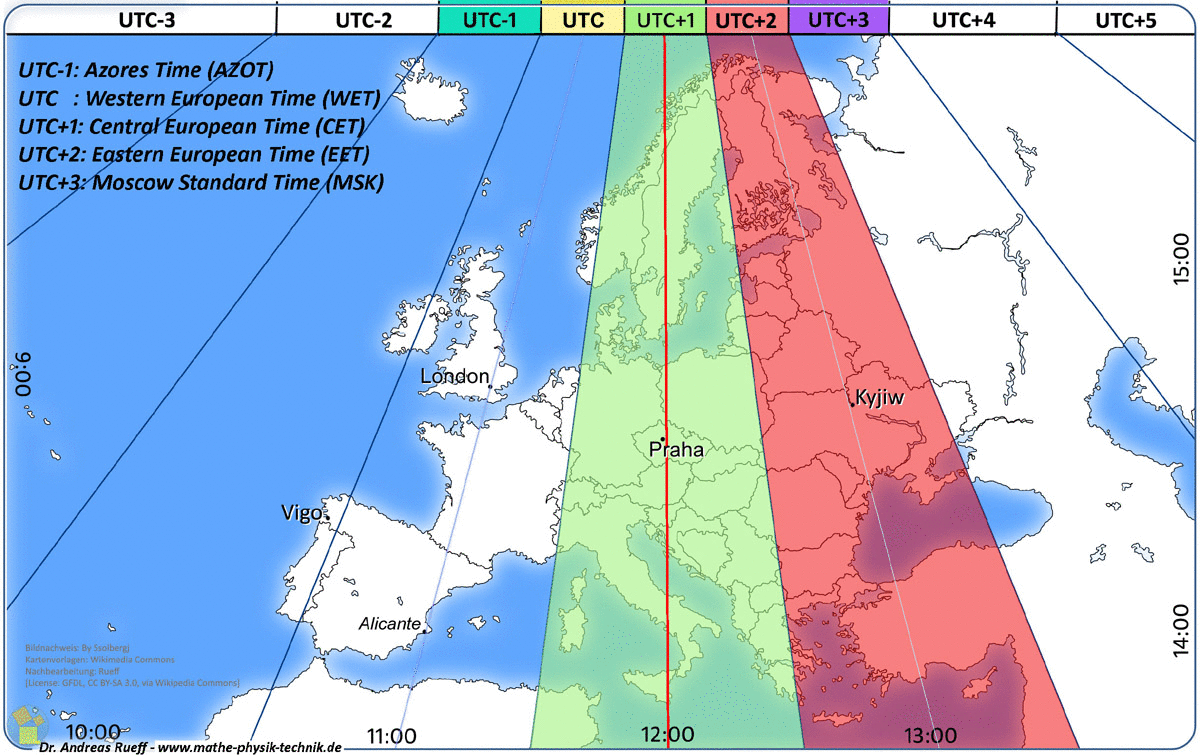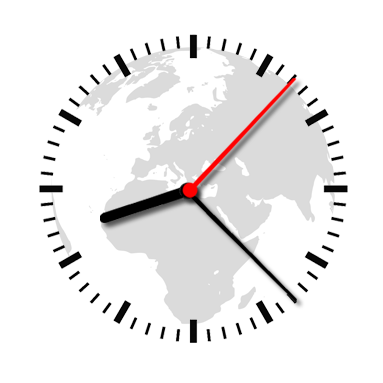Not summertime, not wintertime, but healthtime!
That is, our own natural Western European time zone for Western Europe:

➡️ For the latest news on the EU proposal see our newsletters in the sidebar (or below if you are viewing this on your mobile). Want to stay informed? Subscribe!
RIVM conclusions
On October 15th 2019, the Dutch Royal Institute For Public Health and Environment (RIVM) clearly concludes in its report 'Standard time, summer time and health' (now available in English translation, the abstract also in French and German) that:
Clock changes are unhealthy
According to the RIVM, standard time (UTC + 1) is better for public health than "summer time" (UTC + 2) and it would be even better if the Netherlands used its own geographical time zone (UTC).
➡️ This RIVM advice corresponds with the conclusions of our position paper, in which we explain why abolishing DST-changes and switching to our own time zone is also a win-win solution for the rest of Western Europe.
❓What exactly is ‘summertime’, 'wintertime’ and Daylight Saving Time (DST)?
❓What are bi-annual clock changes, seasonal changes of time and time zones?
❓How and why does all this have such a big impact on our health, safety and well-being?
❓How and why does all this have such a big impact on our health, safety and well-being?
We explain all this and more in our position paper 'Timing is everything', also available in French, Spanish and Dutch and downloadable from the sidebar to the right or below.
➡️ You can check out the table of contents below, as well as a list of interesting sources - articles and research links from our paper's references.
About us
Choose Gezondtijd! ('Health time!' - a Dutch play on words referring to 'gezondheid' = health and 'tijd' = time) is a collaboration between several advocates for a healthier time policy in the Netherlands: Better Times Platform (formerly B-Society NL), Standard time and Stop the summertime, the clock has to turn back (which set up the petition and presented it to the EC in 2017). We joined forces in response to the EU proposal 'European directive on discontinuing seasonal changes of time', in order to draw attention to the new scientific insights into this complex issue and its broad social impact.
We were invited to the various DST expert sessions that the Ministry of the Interior (BZK) held from October 2018 to June 2019. On August 15th 2019 we presented and explained our position paper 'Timing is everything’ to BZK officials. They forwarded our paper for notification to the Royal Institute For Public Health and Environment (RIVM) and the Ministry of Health, Welfare and Sports (VWS).
The authors of the position paper are Conny Bergé and Ticia Luengo Hendriks of Platform Betere Tijden. The content of this paper is based on the latest scientific knowledge and has been fact checked by chronobiologist, light and sleep researcher Dr. Marijke Gordijn.
'Timing is everything'
Table of contents:
SummaryPurpose of this paper
1. Motivation
1a - European directive on discontinuing seasonal changes of time
1b - State of affairs in the Netherlands
2. Context
2a - Origin of time zones and standard times
2b - Origin of bi-annual clock changes / DST
2c - The biological clock and rhythms
2d - The importance of sleep
2e - Chronotypes
2f - Social jetlag and time zones
2g - The importance of light
3. Social consequences
3a - Health
3b - Work
3c - Education
3d - Traffic and transport
3e - Safety
3f - Energy and environment
3g - Finance and economy
4. Conclusions
- High time for a Time policy!
- Dutch best option
- European best option
Appendix
- References
- About the authors
- Version control
Resources
Here you will find a selection of interesting articles and research used for our position paper.In our position paper we explain these topics and how they are related to each other.
Government resources
- Standard time, summertime and health - Report by the RIVM (Dutch Royal Institute For Public Health and Environment), as commissioned by the Dutch Ministry of Health, Welfare and Sport, 15-11-2019
- Zomertijd en wintertijd - Dutch information- and documentation package by the ministerie of BZK (Dutch Ministry of the Interior and Kingdom Relations)
- Seasonal changes of time - EU information- and documentation package
- Seasonal clock changes in the EU - EU Council of Ministers information- and documentation package
- Seasonal clock change in the EU - EU Transport Council information- and documentation package
- Expert workshop voor de EU Transport Commissie on 21-01-2019, videoregistration:
- Long distance travel – potential impacts (min. 16:00:08)
- Possible consequences on road safety (min. 16:08:10)
- Impacts on energy savings and energy markets (min 16:16:55)
- Potential health and well-being impacts (min 16:24:30)
- Observance of the system of European time zones - EU-report from 2000 mentioning a.o.t. air pollution
Scientific statements
- Joint statement to the EU commission on DST - from the European Sleep Research Society (ESRS), the European Biological Rhythms Society (EBRS) and the Society for Research on Biological Rhythms (SRBR), 25-10-2018
- Zomertijd afschaffen - Joint statement from the Dutch Association for Sleep-Wake Research and the Dutch Society for Sleep medicine, 2018
- Impact of Daylight Saving Time on circadian timing system: An expert statement - Artikel in European Journal of Internal Medicine, 2018
- Why Should We Abolish Daylight Saving Time? - Position paper from the Society for Research on Biological Rhythms, 06-06- 2019
- Time to Show Leadership on the Daylight Saving Time Debate - Editorial in Journal of Clinical Sleep Research, 2019
- Overheid moet snel beslissing nemen over permanente zomer- en wintertijd -Position of the Dutch Brain Association, 2019
Chronobiology- Press kit on DST - Society for Research on Biological Rhythms information- and documentation package
- Daylight Saving Time and Artificial Time Zones – A Battle Between Biological and Social Times - Article in Frontiers in Physiology, 2019
- 2017 Nobel prize in Physiology or Medicine for the founders of the current knowledge about the biological clock.
Health- The best thing you can do for your health: sleep well - Article in The Guardian, Matthew Walker, 2017
- Social jetlag – are late nights and chaotic sleep patterns making you ill? - Article in The Guardian 2019
- ‘Catching up’ on sleep on the weekend doesn’t work - Source Colorado University, 2019
- Sleep Disorders and Sleep Deprivation: An Unmet Public Health Problem - Article from the US Institute of Medicine, 2006
- How living on the wrong side of a time zone can be hazardous to your health - Article in The Washington Post 2018
Economy
- Why sleep matters — the economic costs of insufficient sleep - Research by international think tank the Rand Corporation
- Effects of Daylight-Saving Time Changes on Stock Market Returns and Stock - Article in Psychological Reports 2013
- Sunset time and the economic effects of social jetlag: evidence from US time zone borders - Article in Journal of health economics, 2019
Education
- Time to learn: How chronotype impacts education - Article in PsyCh Journal, 2017
- Is 8:30 a.m. Still Too Early to Start School? A 10:00 a.m. School Start Time Improves Health and Performance of Students Aged 13-16 - Article in Frontiers in Human Neuroscience, 2017
- Identifying the Best Times for Cognitive Functioning Using New Methods: Matching University Times to Undergraduate Chronotypes - Article in Frontiers in Human Neuroscience, 2017
Traffic
- Impact of daylight saving time on road traffic collision risk: a systematic review - Article in British Journal of Medicine, 2017
Nature and the environment
- City lights make air pollution worse - Source PhysOrg.com, 2010
- The new world atlas of artificial night sky brightness - Article in Science advances, Light-atlas en worldwide light pollution maps
- Signalen van brede gevolgen kunstlicht gevonden in natuur -Dutch Institute for Ecologie, 2016
Recommended books
- Paul Kelley, 2018: Body Clocks. The biology of time for sleep, education and work
- Matthew Walker, 2017: Why we sleep
- Chris Pearce, 2017: The Great Daylight Saving Time Controversy
- Till Roenneberg, 2013: Internal time
- The best thing you can do for your health: sleep well - Article in The Guardian, Matthew Walker, 2017
- Social jetlag – are late nights and chaotic sleep patterns making you ill? - Article in The Guardian 2019
- ‘Catching up’ on sleep on the weekend doesn’t work - Source Colorado University, 2019
- Sleep Disorders and Sleep Deprivation: An Unmet Public Health Problem - Article from the US Institute of Medicine, 2006
- How living on the wrong side of a time zone can be hazardous to your health - Article in The Washington Post 2018
Economy
- Why sleep matters — the economic costs of insufficient sleep - Research by international think tank the Rand Corporation
- Effects of Daylight-Saving Time Changes on Stock Market Returns and Stock - Article in Psychological Reports 2013
- Sunset time and the economic effects of social jetlag: evidence from US time zone borders - Article in Journal of health economics, 2019
Education
- Time to learn: How chronotype impacts education - Article in PsyCh Journal, 2017
- Is 8:30 a.m. Still Too Early to Start School? A 10:00 a.m. School Start Time Improves Health and Performance of Students Aged 13-16 - Article in Frontiers in Human Neuroscience, 2017
- Identifying the Best Times for Cognitive Functioning Using New Methods: Matching University Times to Undergraduate Chronotypes - Article in Frontiers in Human Neuroscience, 2017
Traffic
- Impact of daylight saving time on road traffic collision risk: a systematic review - Article in British Journal of Medicine, 2017
Nature and the environment
- City lights make air pollution worse - Source PhysOrg.com, 2010
- The new world atlas of artificial night sky brightness - Article in Science advances, Light-atlas en worldwide light pollution maps
- Signalen van brede gevolgen kunstlicht gevonden in natuur -Dutch Institute for Ecologie, 2016
Recommended books
- Paul Kelley, 2018: Body Clocks. The biology of time for sleep, education and work
- Matthew Walker, 2017: Why we sleep
- Chris Pearce, 2017: The Great Daylight Saving Time Controversy
- Till Roenneberg, 2013: Internal time
